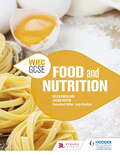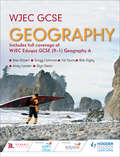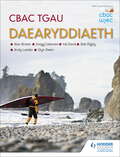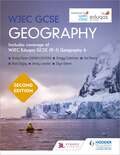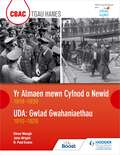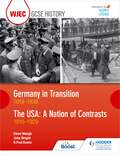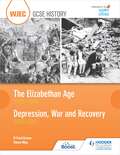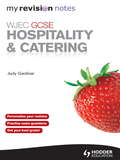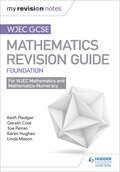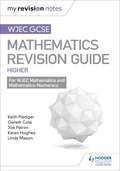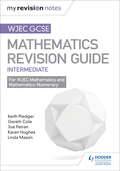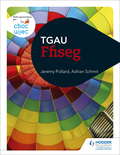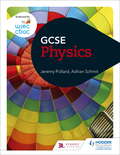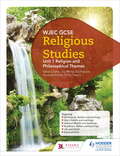- Table View
- List View
WJEC GCSE Food and Nutrition
by Helen Buckland Jacqui KeepinEngage your students in all aspects of food and nutrition, improve their practical food preparation skills and prepare them for assessment with this book written specifically for the new WJEC Food and Nutrition GCSE for Wales.This book is endorsed by WJEC.- Ensures your students understand the subject content with accessible explanations of all concepts, including simple definitions of key words- Develops cooking and food preparation skills with engaging and cost-effective practical activities throughout- Differentiates with stretch and challenge activities to ensure progression and to challenge more able learners- Includes extensive guidance on the Food Preparation and Nutrition in Action non-examination assessment tasks- Prepares students for the written exam with exam preparation advice and practice questions with worked answers, mark schemes and commentary
WJEC GCSE Food and Nutrition
by Helen Buckland Jacqui KeepinExam Board: WJECLevel: GCSESubject: Food & NutritionFirst Teaching: September 2016First Exam: June 2018Engage your students in all aspects of food and nutrition, improve their practical food preparation skills and prepare them for assessment with this book written specifically for the new WJEC Food and Nutrition GCSE for Wales.This book is endorsed by WJEC.- Ensures your students understand the subject content with accessible explanations of all concepts, including simple definitions of key words- Develops cooking and food preparation skills with engaging and cost-effective practical activities throughout- Differentiates with stretch and challenge activities to ensure progression and to challenge more able learners- Includes extensive guidance on the Food Preparation and Nutrition in Action non-examination assessment tasks- Prepares students for the written exam with exam preparation advice and practice questions with worked answers, mark schemes and commentary
WJEC GCSE Geography
by Alan Brown Andy Leeder Gregg ColemanHelp your students develop enquiring minds as they learn the geographical knowledge and skills they need through the enquiries of the new OCR B specification which include and up-to-date case studies, a wide range of activities and exam-style questions developed to support and stretch students of all abilities.- Supports students of all abilities through differentiated activities including scaffolded questions and extension questions.- Highlights opportunities for fieldwork throughout the book, and includes guidance on carrying out fieldwork.- Develops students' geographical skills including activities and clear explanations of how to use mathematical and statistical skills.- Helps students gain confidence for the exam with a variety of exam-style practice questions at different levels, with tips on how to approach them.
WJEC GCSE Geography
by Alan Brown Andy Leeder Gregg ColemanEndorsed by WJECDevelop your students' subject knowledge and skills using in-depth topic coverage and developmental activities to create your own teaching pathway through the core and optional content in the 2016 specifications, with support at every stage from the authors of the bestselling WJEC Student Book.- Contains coherent coverage of every core and optional theme in a single volume, with clear explanations of key concepts throughout- Engages and challenges students of all abilities with an exciting, thematic approach, brought to life by Welsh, UK and international place references- Improves students' ability to interpret, analyse and evaluate geographical information through practical, skills-focused activities that involve data, maps and photographs- Boosts candidates' confidence approaching examination by providing numerous learning opportunities for each assessed theme- Enables effective differentiation with enquiry tasks designed to stretch higher-ability students and encourage independent research- Includes trusted guidance from the Field Studies Council on suggested human and physical fieldwork projects and methodologies, making it easier to address the revised fieldwork criteriaThis is a Welsh-language edition.
WJEC GCSE Geography Second Edition
by Alan Brown Bob Digby Andy Leeder Andy Owen Glyn Owen Val Davis Gregg ColemanDevelop your students' subject knowledge and skills using this second edition of the WJEC GCSE Geography student book. Featuring updated case studies, practice questions and clear presentation of key terms, this thoroughly revised edition provides students with the up-to-date knowledge they need to succeed at GCSE.- Contains coherent coverage of every core and optional theme in a single volume, with clear explanations of key concepts throughout- Engages and challenges students of all abilities with an exciting, thematic approach, brought to life by Welsh, UK and international place references- Improves students' ability to interpret, analyse and evaluate geographical information through practical, skills-focused activities that involve data, maps and photographs- Boosts candidates' confidence approaching examination by providing extensive practice questions for each assessed themeThis book also includes coverage of WJEC Geography A.
WJEC GCSE Geography Second Edition
by Alan Brown Bob Digby Andy Leeder Andy Owen Glyn Owen Val Davis Gregg ColemanDevelop your students' subject knowledge and skills using this second edition of the WJEC GCSE Geography student book. Featuring updated case studies, practice questions and clear presentation of key terms, this thoroughly revised edition provides students with the up-to-date knowledge they need to succeed at GCSE.- Contains coherent coverage of every core and optional theme in a single volume, with clear explanations of key concepts throughout- Engages and challenges students of all abilities with an exciting, thematic approach, brought to life by Welsh, UK and international place references- Improves students' ability to interpret, analyse and evaluate geographical information through practical, skills-focused activities that involve data, maps and photographs- Boosts candidates' confidence approaching examination by providing extensive practice questions for each assessed themeThis book also includes coverage of WJEC Geography A.
WJEC GCSE History Germany in Transition, 1919-1939 and the USA: A Nation of Contrasts, 1910-1929
by John Wright Steve Waugh R. Paul EvansExam Board: WJECLevel: GCSESubject: HistoryFirst Teaching: September 2017First Exam: June 2019Endorsed by WJECConfidently tackle curriculum change with the market-leading series for WJEC GCSE History; relaunched to cover the new content and assessment requirements, this book helps every student develop the in-depth knowledge and historical skills they need to achieve their best.- Guides you through the key questions and content in the 2017 specification, with thorough and reliable course coverage from a team of expert examiners, teachers and authors- Builds understanding of Welsh, British and wider-world history through a clear, detailed narrative that is accessible to all learners- Enables students to practise and improve their enquiry, analytical and evaluative skills as they progress through carefully-designed activities in each chapter- Enhances subject knowledge and interest by including a range of stimulating source materials for discussion and reflection- Prepares students for assessment with practice questions, sample responses and step-by-step guidance on approaching questions
WJEC GCSE History Germany in Transition, 1919-1939 and the USA: A Nation of Contrasts, 1910-1929
by John Wright Steve Waugh R. Paul EvansEndorsed by WJECConfidently tackle curriculum change with the market-leading series for WJEC GCSE History; relaunched to cover the new content and assessment requirements, this book helps every student develop the in-depth knowledge and historical skills they need to achieve their best.- Guides you through the key questions and content in the 2017 specification, with thorough and reliable course coverage from a team of expert examiners, teachers and authors- Builds understanding of Welsh, British and wider-world history through a clear, detailed narrative that is accessible to all learners- Enables students to practise and improve their enquiry, analytical and evaluative skills as they progress through carefully-designed activities in each chapter- Enhances subject knowledge and interest by including a range of stimulating source materials for discussion and reflection- Prepares students for assessment with practice questions, sample responses and step-by-step guidance on approaching questions
WJEC GCSE History The Elizabethan Age 1558-1603 and Depression, War and Recovery 1930-1951
by R. Paul Evans Steven MayConfidently tackle curriculum change with the market-leading series for WJEC GCSE History; relaunched to cover the new content and assessment requirements, this book helps every student develop the in-depth knowledge and historical skills they need to achieve their best.- Guides you through the key questions and content in the 2017 specification, with thorough and reliable course coverage from a team of expert examiners, teachers and authors- Builds understanding of Welsh, British and wider-world history through a clear, detailed narrative that is accessible to all learners- Enables students to practise and improve their enquiry, analytical and evaluative skills as they progress through carefully-designed activities in each chapter- Enhances subject knowledge and interest by including a range of stimulating source materials for discussion and reflection- Prepares students for assessment with practice questions, sample responses and step-by-step guidance on approaching questions
WJEC GCSE History The Elizabethan Age 1558-1603 and Depression, War and Recovery 1930-1951
by R. Paul Evans Steven MayEndorsed by WJECConfidently tackle curriculum change with the market-leading series for WJEC GCSE History; relaunched to cover the new content and assessment requirements, this book helps every student develop the in-depth knowledge and historical skills they need to achieve their best.- Guides you through the key questions and content in the 2017 specification, with thorough and reliable course coverage from a team of expert examiners, teachers and authors- Builds understanding of Welsh, British and wider-world history through a clear, detailed narrative that is accessible to all learners- Enables students to practise and improve their enquiry, analytical and evaluative skills as they progress through carefully-designed activities in each chapter- Enhances subject knowledge and interest by including a range of stimulating source materials for discussion and reflection- Prepares students for assessment with practice questions, sample responses and step-by-step guidance on approaching questions
WJEC GCSE History: Changes in Health and Medicine c.1340 to the present day and Changes in Crime and Punishment, c.1500 to the present day
by R. Paul Evans Alf WilkinsonExam Board: WJECLevel: GCSESubject: HistoryFirst Teaching: September 2017First Exam: June 2019Confidently tackle curriculum change with the market-leading series for WJEC GCSE History; relaunched to cover the new content and assessment requirements, this book helps every student develop the in-depth knowledge and historical skills they need to achieve their best.- Guides you through the key questions and content in the 2017 specification, with thorough and reliable course coverage from a team of expert examiners, teachers and authors- Builds understanding of Welsh, British and wider-world history through a clear, detailed narrative that is accessible to all learners- Enables students to practise and improve their enquiry, analytical and evaluative skills as they progress through carefully-designed activities in each chapter- Enhances subject knowledge and interest by including a range of stimulating source materials for discussion and reflection- Prepares students for assessment with practice questions, sample responses and step-by-step guidance on approaching questions
WJEC GCSE History: Changes in Health and Medicine c.1340 to the present day and Changes in Crime and Punishment, c.1500 to the present day
by R. Paul Evans Alf WilkinsonExam Board: WJECLevel: GCSESubject: HistoryFirst Teaching: September 2017First Exam: June 2019Confidently tackle curriculum change with the market-leading series for WJEC GCSE History; relaunched to cover the new content and assessment requirements, this book helps every student develop the in-depth knowledge and historical skills they need to achieve their best.- Guides you through the key questions and content in the 2017 specification, with thorough and reliable course coverage from a team of expert examiners, teachers and authors- Builds understanding of Welsh, British and wider-world history through a clear, detailed narrative that is accessible to all learners- Enables students to practise and improve their enquiry, analytical and evaluative skills as they progress through carefully-designed activities in each chapter- Enhances subject knowledge and interest by including a range of stimulating source materials for discussion and reflection- Prepares students for assessment with practice questions, sample responses and step-by-step guidance on approaching questions
WJEC GCSE History: Germany in Transition, 1919–1939 and the USA: A Nation of Contrasts, 1910–1929
by John Wright Steve Waugh R. Paul EvansEndorsed by WJECConfidently tackle curriculum change with the market-leading series for WJEC GCSE History; relaunched to cover the new content and assessment requirements, this book helps every student develop the in-depth knowledge and historical skills they need to achieve their best.- Guides you through the key questions and content in the 2017 specification, with thorough and reliable course coverage from a team of expert examiners, teachers and authors- Builds understanding of Welsh, British and wider-world history through a clear, detailed narrative that is accessible to all learners- Enables students to practise and improve their enquiry, analytical and evaluative skills as they progress through carefully-designed activities in each chapter- Enhances subject knowledge and interest by including a range of stimulating source materials for discussion and reflection- Prepares students for assessment with practice questions, sample responses and step-by-step guidance on approaching questions
WJEC GCSE History: The Elizabethan Age 1558–1603 and Depression, War and Recovery 1930–1951
by Steve May R. Paul EvansEndorsed by WJECConfidently tackle curriculum change with the market-leading series for WJEC GCSE History; relaunched to cover the new content and assessment requirements, this book helps every student develop the in-depth knowledge and historical skills they need to achieve their best.- Guides you through the key questions and content in the 2017 specification, with thorough and reliable course coverage from a team of expert examiners, teachers and authors- Builds understanding of Welsh, British and wider-world history through a clear, detailed narrative that is accessible to all learners- Enables students to practise and improve their enquiry, analytical and evaluative skills as they progress through carefully-designed activities in each chapter- Enhances subject knowledge and interest by including a range of stimulating source materials for discussion and reflection- Prepares students for assessment with practice questions, sample responses and step-by-step guidance on approaching questions
WJEC GCSE Hospitality and Catering: My Revision Notes
by Judy GardinerThe only revision guide available for students preparing to take the GCSE in Hospitality & Catering. This WJEC endorsed guide takes a topic by topic approach that will highlight the key facts students need to know in order to succeed. Targeted exam questions also provide plenty of opportunity for practice.It offers clear guidance for the preparation of all elements of the qualification. It features:Full topic by topic support to help students get to grips with difficult and confusing areasDedicated sections on how to successfully complete coursework tasks (Catering controlled assessments and Hospitality events tasks)Support in identifying the key facts of the required topicsTargeted questions, revision tips and revision activities, which keep revision engaging and help to consolidate knowledge
WJEC GCSE Maths Foundation: Mastering Mathematics Revision Guide
by Karen Hughes Linda Mason Gareth Cole Keith Pledger Joe PetranExam Board: WJECLevel: GCSESubject: MathematicsFirst Teaching: September 2015First Exam: June 2017Maximise your students' grade potential with a step-by-step approach that builds confidence through topic summaries, worked examples and exam style questions- Identify areas of improvement to focus on through diagnostic tests for each topic.- Develop exam skills and techniques with skills-focused exam-style questions and exam advice on common pitfalls.- Build understanding and confidence with clear explanations of each topic covering all the key information needed to succeed.- Consolidate revision with 'two weeks to go' summaries for each topic.
WJEC GCSE Maths Higher: Mastering Mathematics Revision Guide
by Gareth Cole Keith Pledger Joe PetranExam Board: WJECLevel: GCSESubject: MathematicsFirst Teaching: September 2015First Exam: June 2017Maximise your students' grade potential with a step-by-step approach that builds confidence through topic summaries, worked examples and exam style questions.- Identify areas of improvement to focus on through diagnostic tests for each topic.- Develop exam skills and techniques with skills-focused exam-style questions and exam advice on common pitfalls.- Build understanding and confidence with clear explanations of each topic covering all the key information needed to succeed.- Consolidate revision with 'two weeks to go' summaries for each topic.
WJEC GCSE Maths Higher: Mastering Mathematics Revision Guide
by Gareth Cole Keith Pledger Joe PetranExam Board: WJECLevel: GCSESubject: MathematicsFirst Teaching: September 2015First Exam: June 2017Maximise your students' grade potential with a step-by-step approach that builds confidence through topic summaries, worked examples and exam style questions.- Identify areas of improvement to focus on through diagnostic tests for each topic.- Develop exam skills and techniques with skills-focused exam-style questions and exam advice on common pitfalls.- Build understanding and confidence with clear explanations of each topic covering all the key information needed to succeed.- Consolidate revision with 'two weeks to go' summaries for each topic.
WJEC GCSE Maths Intermediate: Revision Guide
by Gareth Cole Keith Pledger Joe PetranExam Board: WJECLevel: GCSESubject: MathematicsFirst Teaching: September 2015First Exam: June 2017Maximise your students' grade potential with a step-by-step approach that builds confidence through topic summaries, worked examples and exam-style questions; developed specifically for the new Mathematics specifications, with leading Assessment Consultant Keith Pledger.- Identify areas of improvement to focus on through diagnostic tests for each topic.- Develop exam skills and techniques with skills-focused exam-style questions and exam advice on common pitfalls.- Build understanding and confidence with clear explanations of each topic covering all the key information needed to succeed.- Consolidate revision with 'two weeks to go' summaries for each topic.
WJEC GCSE Maths Intermediate: Revision Guide
by Gareth Cole Keith Pledger Joe PetranExam Board: WJECLevel: GCSESubject: MathematicsFirst Teaching: September 2015First Exam: June 2017Maximise your students' grade potential with a step-by-step approach that builds confidence through topic summaries, worked examples and exam-style questions; developed specifically for the new Mathematics specifications, with leading Assessment Consultant Keith Pledger.- Identify areas of improvement to focus on through diagnostic tests for each topic.- Develop exam skills and techniques with skills-focused exam-style questions and exam advice on common pitfalls.- Build understanding and confidence with clear explanations of each topic covering all the key information needed to succeed.- Consolidate revision with 'two weeks to go' summaries for each topic.
WJEC GCSE Physics
by Jeremy Pollard Adrian SchmitExam Board: WJECLevel: GCSESubject: PhysicsFirst Teaching: September 2016First Exam: June 2018Welsh edition. Help students to apply and develop their knowledge and understanding of Physics with this textbook that builds mathematical skills, provides practical assessment guidance and support for all the required practicals. - Prepare students to approach exams confidently with differentiated Test Yourself questions, Discussion points, exam-style questions and useful chapter summaries.- Provide support for all required practicals along with extra tasks for broader learning. - Support the mathematical and Working scientifically requirements of the new specification with opportunities to develop these skills throughout. - Supports the separate science Physics and can be used for the WJEC GCSE Science (Double Award) qualification.
WJEC GCSE Physics
by Jeremy Pollard Adrian SchmitPart of the WJEC endorsement process. Help students to apply and develop their knowledge and understanding of Physics with this textbook that builds mathematical skills, provides practical assessment guidance and support for all the required practicals. - Prepare students to approach exams confidently with differentiated Test Yourself questions, Discussion points, exam-style questions and useful chapter summaries.- Provide support for all required practicals along with extra tasks for broader learning. - Support the mathematical and Working scientifically requirements of the new specification with opportunities to develop these skills throughout. - Suitable to support the WJEC GCSE Science (Double Award) qualification.
WJEC GCSE Physics
by Jeremy Pollard Adrian SchmitExam Board: WJECLevel: GCSESubject: PhysicsFirst Teaching: September 2016First Exam: June 2018Welsh edition. Help students to apply and develop their knowledge and understanding of Physics with this textbook that builds mathematical skills, provides practical assessment guidance and support for all the required practicals. - Prepare students to approach exams confidently with differentiated Test Yourself questions, Discussion points, exam-style questions and useful chapter summaries.- Provide support for all required practicals along with extra tasks for broader learning. - Support the mathematical and Working scientifically requirements of the new specification with opportunities to develop these skills throughout. - Supports the separate science Physics and can be used for the WJEC GCSE Science (Double Award) qualification.
WJEC GCSE Religious Studies: Unit 1 Religion and Philosophical Themes
by Steve Clarke Joy White Chris Owens Ed Pawson Amanda RidleyExam Board: WJEC Level: GCSE Subject: Religious Studies First Teaching: September 2016 First Exam: Summer 2018For the new Welsh specification for first teaching 2017Stretch and challenge your students to achieve their full potential with learning materials that guide them through the new Unit 1 content and assessment requirements; developed by subject experts with examining experience and the leading Religious Studies publisher- Enables you to teach philosophical themes confidently with clear explanations of Christian, Muslim, Jewish and Buddhist beliefs and practices.- Motivates students to build and cement their knowledge and skills using a range of imaginative, innovative activities that support learning and revision.- Prepares students for examination with exam focus sections at the end of each unit that provide guidance on how to tackle questions.- Helps students of all abilities fulfil their potential and increase their understanding through clear, detailed explanations of the key content and concepts.WJEC GCSE Religious StudiesUnit 1 Religious Responses to Philosophical ThemesCovering:- Christianity- Islam- Judaism- Buddhism- Life and Death- Good and Evil
WJEC GCSE Religious Studies: Unit 1 Religion and Philosophical Themes
by Joy White Chris Owens Ed PawsonExam Board: WJEC Level: GCSE Subject: Religious Studies First Teaching: September 2016 First Exam: Summer 2018For the new Welsh specification for first teaching 2017Stretch and challenge your students to achieve their full potential with learning materials that guide them through the new Unit 1 content and assessment requirements; developed by subject experts with examining experience and the leading Religious Studies publisher- Enables you to teach philosophical themes confidently with clear explanations of Christian, Muslim, Jewish and Buddhist beliefs and practices.- Motivates students to build and cement their knowledge and skills using a range of imaginative, innovative activities that support learning and revision.- Prepares students for examination with exam focus sections at the end of each unit that provide guidance on how to tackle questions.- Helps students of all abilities fulfil their potential and increase their understanding through clear, detailed explanations of the key content and concepts.WJEC GCSE Religious StudiesUnit 1 Religious Responses to Philosophical ThemesCovering:- Christianity- Islam- Judaism- Buddhism- Life and Death- Good and Evil
